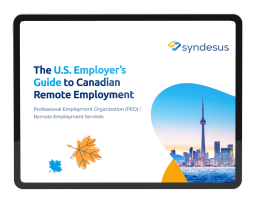The rise of remote work has blurred international borders in exciting ways. Many people, whether H-1B hopefuls who aren’t lucky in the H-1B visa lottery, those who have a work visa but don’t want to wait decades for their US green card, are drawn to the idea of living in Canada while continuing to work for a US-based employer.
The reasons can vary from proximity to Canadian family members, the allure of Canada’s natural beauty or lifestyle, or seeking a smoother path to immigration for non-US citizens. It can seem tempting to simply keep your existing employment arrangement, simply move to Canada on a tourist or other visa, and avoid “rocking the boat” with your employer by asking them to employ you correctly in Canada. However, choosing the simplest path in the short term can lead to frustrating tax complications and fines down the road.
We’re going to discuss working remotely in another country without the proper setup, which isn’t the best option. While employing someone correctly in Canada has associated costs, it can actually be cost-effective in other ways, making it a good business move and, importantly, compliant. Let’s dive in.
Why “quietly” working remotely from Canada isn’t a good idea
Keeping your US remote work arrangement informal while in Canada can lead to unexpected problems down the line, particularly when it comes to taxes. Tax laws are complex on their own, and crossing international borders adds a whole new dimension. Working in Canada without informing your US employer means they will likely continue deducting and withholding US taxes. However, Canadian authorities would expect you to pay income tax as a resident if you remain in Canada over 183 days. This can result in double taxation, penalties, and a potential stressful paperwork burden for you and the company.
Other potential problems exist when you operate “under the radar.” You may unknowingly miss out on social benefits offered by Canadian labor laws by not being an official remote employee there, and your existing US-based benefits like health insurance and retirement plans might not be valid in your new location. There are also many extra benefits to being hired legally in Canada. For example, once you’ve lived there as a permanent resident for five years, you can apply to become a Canadian citizen. This can open up a lot of immigration doors, especially if you’re frustrated with the US H-1B visa process and are looking for another option, and also provides a level of additional security.
The most transparent and beneficial path is an honest conversation about working remotely in Canada with your US employer. While this might feel daunting, it protects you and can be cheaper for the company in the long run if they do decide to hire you remotely in Canada. And they don’t need to have an office in Canada and don’t need to understand Canadian labor laws either. Working with a Canadian EOR (Employer of Record) offers a streamlined solution that allows you to work in Canada for your current employer without them needing to do anything out of the ordinary.
A Canadian employer of record can help you work remotely for your US employer in Canada
Tech professionals can enjoy the best of both worlds – a vibrant career with a US employer and the stability and quality of life that Canada consistently delivers. If your current US employer doesn’t have an office based in Canada or isn’t familiar with the specifics of hiring remote workers in Canada, there are other options.
They can try working with a Canadian EOR. An EOR acts as a co-employer, handling human resources, payroll, and other administrative tasks, enabling you to continue working for your US employer even while based in Canada. This offers a legal framework for your employer and means they can easily comply with Canadian labor laws. The EOR will act as the legal employer in Canada, and take over certain responsibilities – tax, insurance, benefits, immigration and legal and compliance. The employee and US employer can maintain their working relationship, meaning only the administrative aspects are routed through the EOR.
Your US employer gets to retain you as a key talent, make sure you’re working legally and compliantly in Canada, and have easy access to that employee when needed. They could even hire multiple employees in Canada and expand their business. You can carry on working for your employer and thus keep your US job while reaping the benefits of life in Canada.
If your US employer has never hired anyone remotely in Canada, you may need to make a case for it. Fortunately, we’ve written a playbook with five reasons that you can present to your employer to make the case that they should let you move to Canada and work remotely in a compliant way.
Syndesus is a Canadian EOR and PEO that can help you work remotely from Canada
Syndesus can help you get started in Canada while continuing to work for your American employer in a hassle-free and legal way. Whether you want to relocate to Canada and retain your current US tech job or you are looking to work for an American employer from Canada for the start and thus avoid the H-1B visa headache, Syndesus can help.
And if your US employer doesn’t have a Canadian office, no problem – as an EOR, Syndesus can legally hire you on behalf of your US employer. We take care of the billing, HR, legal, and other paperwork, and you carry on working in Canada.
Reach out to us to learn more about how we can help you work remotely for a US tech company from Canada!

About Marc Pavlopoulos
Marc Pavlopoulos is the CEO and Founder of Syndesus, a Professional Employer Organization that provides PEO services for US companies seeking to employ workers remotely in Canada, builds engineering teams in Canada for VC-backed startups in the US, and set-up remote offices in Canada for US companies. Additionally, Syndesus can assist foreign-born tech workers (and their US employers) with options for working remotely in Canada if they cannot stay in the US due to immigration/work visa issues.
As an American who has moved to Canada twice (for grad school and for work), Marc understands the challenges involved in starting a new life in a new country. Marc is a son of an immigrant and has great respect for people who leave their home country and seek a better life in the US or Canada.
Marc’s goal is to do everything he can to help those individuals achieve their dreams. Marc also has a second venture (Path to Canada) which helps foreign-born technical workers who cannot stay in the US (for immigration reasons) get a job and work authorization to work in Canada.



